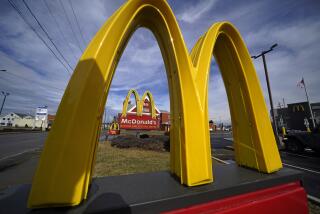Hong Kong Blocks Harris Beef
- Share via
Hong Kong authorities suspended beef imports from Harris Ranch Beef Co. on Tuesday after a bone fragment was found in a shipment from the California company, a violation of local mad cow disease precautions.
Harris Ranch, California’s largest beef producer, is the third U.S. meat processor to be hit with a sales suspension by Hong Kong since an import ban was lifted in January. Hong Kong officials also blocked beef shipments from Cargill Meat Solutions Inc. and Swift Beef Co. because of bone fragments.
Hong Kong, along with several other U.S. trade partners in Asia, has imposed strict import restrictions to prevent the transmission of bovine spongiform encephalopathy, known as mad cow disease. Beef imported into Hong Kong must be boneless, come from cattle less than 30 months old and have spinal and brain matter removed, according to the U.S. Department of Agriculture.
The import constraints replaced a two-year ban on U.S. beef to Hong Kong, which had been the fifth-largest export market for U.S. beef, accounting for about $82 million in annual sales, according to the U.S. trade representative’s office.
Three cases of mad cow disease have been identified in the U.S., said Ed Lyod, a USDA spokesman.
Exports to Hong Kong were a small part of Harris Ranch’s $260 million in annual sales, but with the market set to grow, the company expressed concern over the suspension.
“It’s a minor part of what we do, but I don’t want to minimize its importance,” said Bruce Berven, marketing vice president at Harris Ranch. “We will have to use due diligence to put additional practices in place and do everything in our power to eliminate or minimize the possibility of this type of occurrence.”
The company’s main processing plant in Selma, Calif., produces about 200 million pounds of beef a year, making it the state’s largest beef processor, the company said. Exports to Hong Kong since the ban was lifted totaled about 20,000 pounds.
Berven said the company wasn’t sure when the suspension would be lifted.
As Asian countries lift bans on American beef, companies are preparing for what they believe could be a lucrative business.
“Japan, Korea, China -- these are prime markets,” said Dean Cliver, professor of food safety at UC Davis. “We get extra high prices if we get the right kind of beef to sell there.”
Government officials and industry executives have expressed frustration over the stringent import policies.
“It’s not a safety issue,” Berven said. “Bones are not dangerous from a BSE standpoint. We agreed to ship a boneless product ... but it’s very difficult to ensure that there can’t be one little fragment somewhere.”
Consuming beef contaminated with mad cow disease is linked to variant Creutzfeldt-Jakob disease, a degenerative and fatal brain disorder in humans. But the risk of contracting the disease is extremely low, Cliver said.
“The money and the resources that are being devoted to this by the U.S. are coming at the expense of other food-safety things that are more urgent and more real,” he said.
More to Read
Sign up for Essential California
The most important California stories and recommendations in your inbox every morning.
You may occasionally receive promotional content from the Los Angeles Times.









